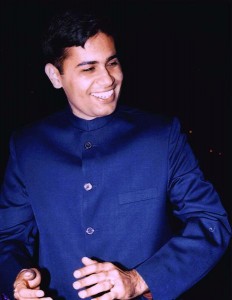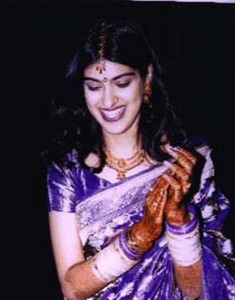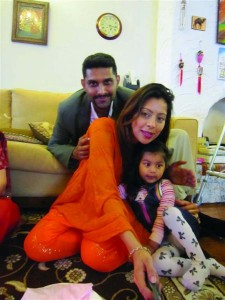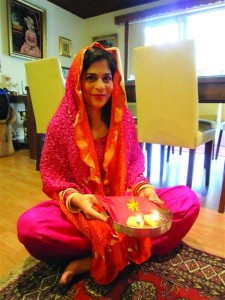‘Fast’ forward… to Karwachauth
Lokesh Varma and Neeru Saluja
By Ritu Ghai and
Neena Badhwar
Shiva, a principal Hindu god, asked his wife, Parvati, to fast for him because he believed the sacrifice would guarantee his long life. Known for her devotion to her husband, Parvati agreed. The mischievous god Krishna then spread the story to humans, who took up the practice. Another famous tale is about Queen Veeravati, whose seven brothers could not see her hungry for a day and duped her into believing the moon is out. In haste the sister breaks the fast and finds her husband fatally ill the next day. She revives him by removing the needles embedded in the King’s body and observing the fast faithfully.
Plenty of such stories on Karwachauth are heard, believed and followed by Indian women across the globe. Women in North are brought up to believe in this tradition and that succumbing to hunger and breaking their fast would cause their husbands to fall sick and die.
More than just missing a meal”¦
The myths are compelling, at times scary but enough to drive every women to follow this ritual. What makes this day worth remaining hungry is the glamour attached to it and the absolute love a women expresses towards her husband. Equally divine is the way husbands’ bestow their wives with love, gifts and a special treatment. Even markets are resplendent with Karwa chauth finery, parlours with their package offers, clubs organizing special events with various stalls, bumper Tambola and dance competition – Karwa Chauth is no longer about suffering a day without food. There is so much to enjoy so even if you miss a meal what’s the big deal – feel many young women of today.
To further add glamour to its festive spirit are Bollywood films and TV serials that glorify this day. Sydney has seen its own Karwachauth get togethers, pujas organized by ladies till this year as the custom has left ladies’ domain and has taken up commercial undertomes in the form a ‘Karwachauth Mela’ which turned out to be a huge success as women turned up in gorgeous saris and shalwar suits and there was plenty of entertainment, song, dance and fashion parade.
Says Neeru Saluja, TIDU’s Bollywood reporter, who does not adhere to stereotypes or subject herself into a submissive marital position but when it comes to Karwachauth she looks forward to the day, “Karva Chauth has always been a festival close to my heart. Since I was a little girl, I saw my mum fasting for my dad and the best part of the day was buying fresh matthies and applying mehndi! A day before Karva Chauth I go to Harris Park every year for my sargi – matthi, mithai, bindis and bangles. Reminds me of my India. I celebrate the day with my girlfriends, we get together before sunset for the puja, watch a Bollywood movie together and then wait for the moon to break our fast and then feast on delicacies!”
“It’s a great night out with friends. After the fast there’s so much to eat as we all bring a dish. I do get asked at work whether my husband keeps a fast for me. But I don’t mind playing second fiddle to my husband as I love this custom – it not only bonds us together, even my daughter watches me doing puja and seeing the moon before breaking the fast. She loves getting dressed up and putting bangles on!” says Neeru.
“Although society is changing and girls expect equality in a relationship. Yet I find the younger generation is adapting the Karwachauth custom quite willingly. There’s got to be some appeal in the whole concept of it all. It is not just the long life of the husbands girls wish for. In the same wish they wish that they have a good understanding partner who loves them back and cares for them in return. So actually the women are looking for their own well being in a healthy, happy and loving relationship. This day is a reminder to that the vow we took as a couple when we started our life together,” said Neeru.
TIDU spoke to Meena Berry married to Ravi who says about Karwachauth, “For me a day of fast is something quite small a gesture to ask for something big in return. I actually feel privileged to celebrate and honour the bond and it is a reminder for honouring the sanctity of the our relationship. Its not a big deal at all as the fast is done only once a year. To me I think it is sweeter than valentine even.”
Ravi and Meena Berry with daughter
“People these days tend to buy happiness to stimulate their senses materialistically though for me it is a day of spirituality and an occasion to cleanse your thoughts. It’s a time to detox if you have any bitterness towards this person, says Meena. For her ‘Karwa’ means ‘bitter’ – so take away any bitterness out of the relationship and think of the person you are married to with pure intention and faith.”
“I saw my mum giving attention to dad and for her he is next to God.” When asked should the husband also fast? She says, ‘If they do it out of their own choice well and good. You can’t force them to fast for you. There’s no expectation but it all comes back. I know my husband respects me for what I do for him. If it brings us together then why not do it without asking anything in return,” says Meena.
Anoushka Paul
Anoushka Paul, a researcher with a pharmaceutical companymarried this year to Anthony Perumal of Sri Lankan origin, says, “My husband does not know about this custom but he appreciated the gesture and it was a memorable day for me to connect to the women of the family in the knowledge that my mum, my dadima, my nanima have all been doing the fast for a long, happy life for their husbands and in return wishing themselves a happy married life. Why I do it is because I think it is a nice feeling to share the tradition and am happy to do it quite willingly. ”
However this ritual becomes a torture for those women whose husbands are abusive towards them or do not care about their feelings. When one hears of domestic violence, this custom holds no sanctity. It becomes important for all men to respect their wives, rather all women as the progress of a home, a nation depends on the status of its women. Says Meena, “If you love someone dearly and are willing to endure then do the Karwachauth. May be it is worth fighting for that relationship. But if there’s abuse, other problems then one must resort to counseling or seek help from outside,” comments Meena reflectively.
‘Fast’ Facts”¦
Karwa Chauth is celebrated on the fourth day after the night of the full moon in the month of Karthik. According to the Hindu calendar, the fast is observed on chauth, the fourth night after the full moon, in the month of Kartikka, which corresponds to sometime in October or November.
On this day, wives observe a 24-hour long fast for the long life and wellbeing of their husbands. They start fasting at night, after the moon has risen and continue until the next evening, when the women dress up in their wedding finery and await the rising of the moon once more, which signifies that their fast can now be broken.
Women hold a plate toward the moon and look at it through a sieve held in the other hand. After offering rice, water and food to the moon, they open turn to look at their husband through this sieve, touch his feet and break their fast by taking a bite of food from their hand.
Of course, people in different regions of India tend to celebrate differently now and certain exemptions are possible in today’s time. If the husband is away on business, the wife can break the fast by looking at his photograph or after a telephone talk.
Some find it anachronistic, some find it a ritual to be followed with no questions asked and no explanations given, for some its pure devotion and for a few its totally illogical. Even women who take gender equality seriously seem to be keeping this fast to keep tradition alive and show their partner how much they care. But ritual or no ritual, this day is pure festivity for our karwa chauth ridden society.
Short URL: https://indiandownunder.com.au/?p=1036




